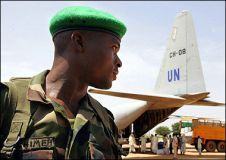Sudan bows to pressure, allows AU to monitor police in Darfur camps
KHARTOUM, Sept 29 (AFP) — Sudan bowed to mounting pressure over the crisis in Darfur and agreed to allow African Union forces to monitor the activities of its police in camps for displaced persons in the region.
 Radhia Achouri, a spokesperson for the UN special envoy to Sudan, Jan Pronk, told reporters here that the move was aimed at reassuring displaced persons, many of who have lost confidence in the police.
Radhia Achouri, a spokesperson for the UN special envoy to Sudan, Jan Pronk, told reporters here that the move was aimed at reassuring displaced persons, many of who have lost confidence in the police.
She added that the presence of the AU forces in and around the camps would further help “restore trust between the displaced persons and the police”.
The Sudanese government’s consent to the arrangement represented the first concrete action towards implementing UN Security Council resolution 1556 that was passed on September 18.
The resolution, the second on the Darfur crisis, called for the deployment of additional numbers of AU observers and forces in the region and an investigation into charges of genocide in Darfur.
It also warned Khartoum of possible sanctions against its oil industry unless it protects the region’s population.
International humanitarian agencies operating in the region say despite that earlier pledges by the government to stabilize the security situation, abuse, including rape, continues.
The deployment of more police in the region has also done little to prevent attacks against the displaced, particularly women who venture outside the camps to collect wood, the agencies added.
“The stories we heard in all three states of Darfur convey an acute sense of insecurity,” said UN High Commissioner for Human Rights Louise Arbour after a recent visit to Darfur.
Many refugees “continue to live in a climate of fear”, she added.
The United Nations has been putting pressure on Khartoum to disarm the Janjaweed and increase security in the area so refugees may return home, but Arbour said “displaced people cannot envisage returning home because they do not trust the government of Sudan to protect them.”
She said “at best they feel the authorities respond inadequately to their concerns, and at worst that they are in collusion with their abusers, including armed groups and militias generally described as Janjaweed.”
Achouri told reporters that displaced persons in the Jumaina I and Jumaina II camps in South Darfur have been subjected to intimidation and terror by groups believed to be Janjaweed militias.
She stressed, however, that deploying AU forces in camps scattered all over Darfur, a region the size of France, would only be possible with increased numbers of troops.
An AU source told AFP on Wednesday the organization was planning to send “several thousand” more troops to Darfur, where it has already deployed military observers and a modest protection force.
“We are going to send several thousand soldiers,” the AU official said, adding the deployment would be conducted with the agreement of all parties concerned, notably the government in Khartoum.
Speaking to AFP from AU headquarters in Addis Ababa, the official explained that the mandate of the planned “substantially reinforced” mission would be determined at a meeting of the AU’s Peace and Security Council in coming weeks.
The UN’s Pronk announced last Thursday in Khartoum that the AU and the UN were studying a plan to deploy some 5,000 military observers and forces to protect them in the Darfur region.
Sudan has told the two international bodies that it would welcome a proposed increase in the African military force protecting AU observers monitoring a ceasefire agreement in Darfur.
Agriculture Minister Majzoub al-Khalifa Ahmed was quoted by Al-Rai Al-Aam daily last Monday as saying the government had sent official messages to the two organizations giving its consent to more African troops.
Sudan had until recently resisted calls to boost the size of the AU force in Darfur, fearing a larger AU military presence would automatically transform it into a peacekeeping force, which Khartoum opposes.
The government argues that it alone is responsible for policing the region and maintaining law and order, insisting that an AU force with a broader mandate would further complicate the situation in Darfur.
